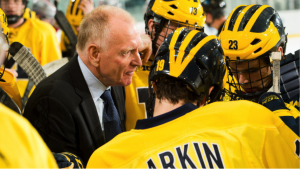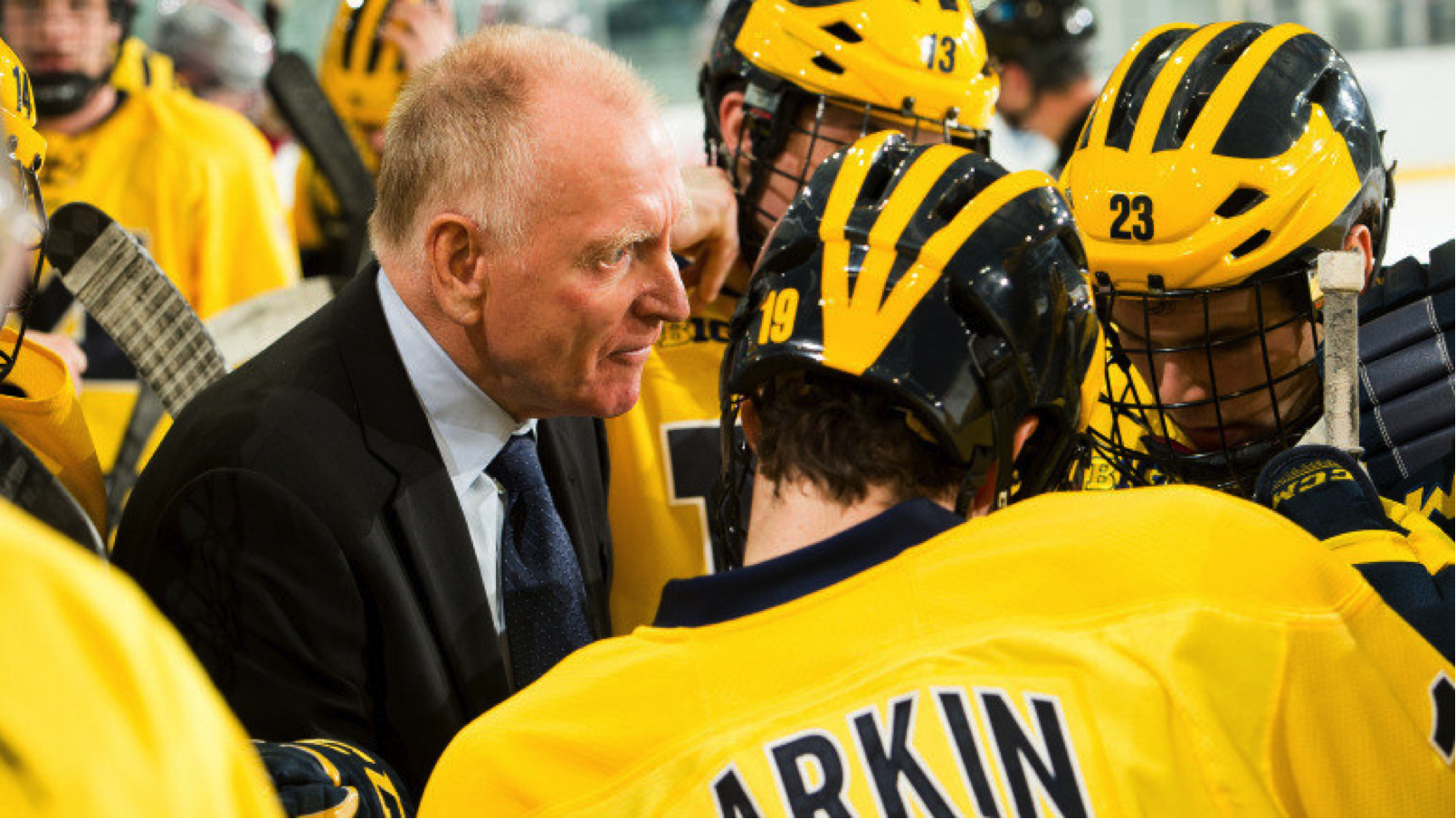 To open a season of high expectations, Michigan pummeled Toronto in an exhibition contest at Yost Ice Arena by a score of eight to one–a final result surprising no one. The Wolverines are coming off a relatively underwhelming 2014 season, finishing 20th in the USCHO.com poll and missing an automatic berth to the NCAA playoff at the hands of the Minnesota Golden Gophers in a four to two loss. This year, hopes are much higher. Michigan returns seven of its top ten scorers from last year–a unit that placed first in the nation in scoring with an astounding 3.86 goals per game.
To open a season of high expectations, Michigan pummeled Toronto in an exhibition contest at Yost Ice Arena by a score of eight to one–a final result surprising no one. The Wolverines are coming off a relatively underwhelming 2014 season, finishing 20th in the USCHO.com poll and missing an automatic berth to the NCAA playoff at the hands of the Minnesota Golden Gophers in a four to two loss. This year, hopes are much higher. Michigan returns seven of its top ten scorers from last year–a unit that placed first in the nation in scoring with an astounding 3.86 goals per game.
More importantly, returning with the team for his 32rd season at the helm is head coach Red Berenson. In his outstanding career with the Wolverines, Berenson has amassed the fourth highest winning percentage of all D1 coaches, currently standing with a record of 810-399-94. Despite this impressive record, Berenson’s role with the team has been significantly more than just wins. Through his years with the University, Berenson’s persistence and skill helped revive a slumping Wolverines team, putting them back in the national spotlight against private universities that often dominated the NCAA hockey scene.
Before taking his spot on the sidelines, Berenson’s hockey debut began right here in Ann Arbor on the ice. Following a successful junior hockey stint in the late 1950s, Berenson moved on to the University of Michigan to play for the Wolverines. In his collegiate career, Berenson won All-American honors multiple times, leading the team with an NCAA-leading 43 goals in one season.
Following a successful career in the NHL, Berenson returned to Ann Arbor in 1984 to coach at his Alma Mater, taking the reins of a Wolverines hockey team that had not reached the NCAA playoff in fourteen seasons. In this era of collegiate hockey, private schools dominated the ice, including powerhouse programs from Boston College, Harvard and Yale. Upon taking control of the team, Berenson sought to put the Wolverines among the private school greats, making a name not for himself, but for the program he loved.
Berenson’s career began to a sluggish start. In his first three seasons, the team struggled to stay relevant, winning at most thirteen games a season. The Wolverines placed near last in the now-disbanded Central Collegiate Hockey Association (CCHA), and obviously came nowhere near the playoffs.
All that began to change in Berenson’s fourth year as coach. In the 1987 season, Berenson led the Wolverines to their first twenty-win season in over seven years, characterized by an explosive offense and a strong emphasis on crushing defense. At long last, Michigan began to receive the respect they deserved. While not placing in the NCAA playoffs, the team finished no lower than fourth in the highly competitive CCHA over the next three seasons, with Berenson’s presence felt every step of the way.
In 1990, a streak of success began for Berenson and the Wolverines. By season’s end, the team received its first at-large bid in the NCAA playoff since 1976. Unfortunately, the team was swiftly beaten by Boston University in the quarterfinals. Despite the crushing defeat, Berenson’s desire to win only grew. Over the next four seasons, Berenson’s Wolverines made the tournament every single year, placing 1st in the CCHA three times.
At the end of the 1996 season, Michigan Hockey earned its first NCAA championship under Berenson’s direction in over 32 years. After defeating rival Minnesota and the private Boston University, the team faced a highly ranked Colorado College team. In regulation, the Wolverines kept Colorado at bay, letting in only two goals and scoring two of their own to bring the game into overtime. Shortly after, the Wolverines netted the championship-winning goal, sealing their championship crown and forever placing Michigan on a national spotlight among the private school elites. Berenson’s dream had finally been accomplished.
Over the next 25 seasons, Berenson led the Wolverines to the NCAA tournament a record-setting 22 straight times, grabbing another championship and reaching eleven Frozen Four berths. Stemming from Berenson’s strong leadership, Michigan has etched itself among the greats of collegiate hockey, and created a welcoming public face among the private schools that have for so long dominated the sport.
Last season, Berenson achieved a personal milestone, sweeping 9th ranked Minnesota to earn his 800th career win with the team. When asked about his hard work with the team, Berenson responded with only humility.
“Well, the players, they’re excited,” Berenson said. “As hard as I am on them, they are still putting up with me, and they’re trying hard to listen. They’re good kids, so I’m lucky. I want to thank them and all the coaches and players we’ve had in the past.”
Beginning his 32nd season with Michigan Hockey and retirement looming ever near, Wolverine fans across the globe can only be appreciative of Berenson’s lasting impact on the sport and his legend forever carved on the ice at Yost. As a man of few words, Berenson’s lasting impact on the team cannot be adequately surmised by a quote or a speech; rather, a simple action–a timeout–showcases his true legacy.
. . .
Losing 3-0 to Denver, Berenson called a timeout at the 17 minute mark of the second period. When play resumed, Michigan held Denver to only a single shot on net, scoring five goals to seal a Wolverine victory. According to the Athletics Office, emails and calls flooded the department inquiring as to what coach Berenson told his players in the huddle.
To date, it is still not know what Berenson said. Whatever it was, it worked.
